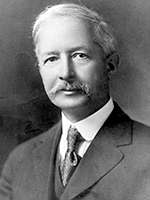Charles Herbert Levermore
Charles Herbert Levermore (October 15, 1856 – October 20, 1927) was an American academic and peace activist. He was a founder and the first president of Adelphi University from 1896 to 1912. He won the American Peace Award in 1924. He was corresponding secretary of the World's Court League in 1919, secretary of the League of Nations Union, and secretary of the New York Peace Society. He was a founding member of the Union League in New York City.[1]

Biography
He was born on October 15, 1856 in Mansfield, Connecticut.[2]
Levermore attended Yale University, where he received an A.B., class of 1879, and Johns Hopkins University, where he received a Ph.D. in 1885. At the latter institution he became friends with a young Thomas Woodrow Wilson, both being fellow members of the Glee Club. Later he became a Professor of History at Massachusetts Institute of Technology. Levermore was appointed head of Adelphi Academy in 1893 and subsequently established the liberal arts Adelphi College in Brooklyn, NY in 1896. Adelphi's main administrative building, Levermore Hall, is named after him[3] and the university's flagship global honors program also bears his name - the Levermore Global scholars Program.[4]
In 1924, Levermore attempted to mobilize support for the League of Nations, conceived by his former classmate, President Woodrow Wilson. Levermore was awarded the American Peace Award, created the year before by Edward Bok, for "the best practicable plan by which the United States may co-operate with other nations to achieve and preserve the peace of the world." This plan would have had the United States enter the League of Nations under special status. However, ultimately, this also proved unsuccessful.[2][5]
He died on October 20, 1927 in Berkeley, California.[1]
Books
- Levermore, Charles H. "Henry C. Carey and his Social System," Political Science Quarterly, Vol. 5, No. 4, Dec., 1890.
References
- "Dr. C. H. Levermore Who Won $100,000 Peace Prize Dies. Native of Mansfield and Yale Graduate Victim of Heart Attack". Associated Press in the Hartford Courant. October 22, 1927. Retrieved 2013-11-18.
Dr. Charles Herbert Levermore, 71, winner of the $100,000 Bok peace prize, dropped dead here yesterday while addressing a women's organization on plans to promote world peace. Physicians said death was caused by heart disease.
- "Charles Herbert Levermore". Retrieved 2013-11-18.
- Adelphi University Campus Map http://map.adelphi.edu/html/BLD_2014092257553.html
- Levermore Global Scholars Program, Adelphi University http://lgs.adelphi.edu/
- "1002nd Night". Time magazine. February 11, 1924. Retrieved 2013-11-18.
The Bok Peace Prize was awarded in Philadelphia before 3,500 citizens who assembled in the Academy of Music. John W. Davis, former Ambassador to Great Britain, made the presentation of the $50,000 check, with $50,000 more to follow if the referendum now being taken shows 'sufficient popular support.' Dr. Charles Herbert Levermore of Brooklyn, former President of Adelphi College, was the recipient. ...
Further reading
- Website of the Historic Bok Sanctuary: https://web.archive.org/web/20070204052919/http://www.boksanctuary.org/history/edward.html